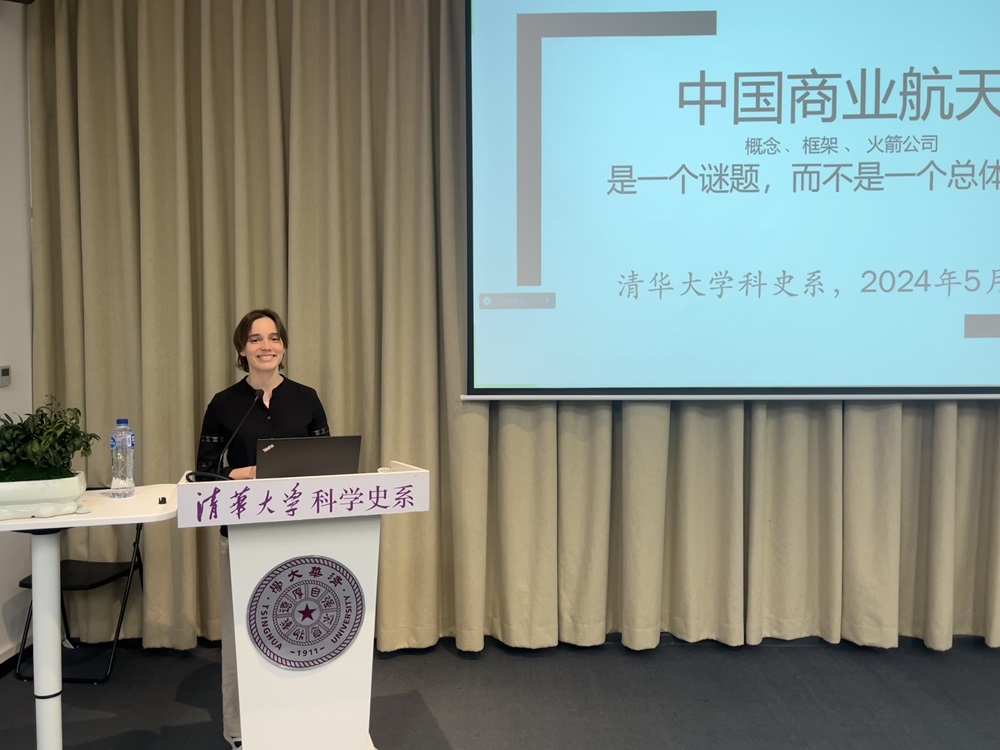On May 8, 2024, the Department of History of Science held the 64th Lecture of the THU History and Philosophy of Science Lecture Series The lecturer was Dr. Lucie Sénéchal Perrouault, Ph.D. candidate at the Centre Alexandre-Koyré, CNRSEHESS, and faculty at the Paris Institute of Political Science. The title of her presentation was " Concept, Corporation and Framework of China 's Commercial Aerospace - Puzzles rather than Master Plans " The lecture was hosted by Associate Professor Lu Yili of the Department of History of Science.More than 70 teachers and students attended the lecture.

Introducing the theme of this lecture from the development of China 's commercial aerospace industry, which has attracted much attention in recent years, Perrouault showcased the multiple launches of rocket companies such as Galactic Energy, Landspace, and ISpace since 2019, including attempts to launch rockets on offshore platforms. In the introduction part of the lecture, Perrouault introduces the background and origin of her doctoral research : the cognitive problems of Chinese commercial aerospace in the existing English literature. By reviewing representative documents such as hearing reports from the US-China Economic and Security Review Committee, think tank reports from the US Defense Analysis Institute ( IDA ) and the China Aerospace Studies Institute, Perrouault pointed out that in the English-speaking world, discourse about China 's commercial aerospace is largely dominated by think tanks and political units, and that the nature of these documents is reports that are not peer-reviewed. China 's commercial aerospace is often understood from the perspective of " great power competition " and " military threat. " The key word is doubt, and it is believed that China 's commercial aerospace is a vague concept.
However, these perspectives are epistemologically limited : they ignore the logic beyond international relations and military, and ignore the diversity, internal relations and dynamics of the participants in China 's commercial aerospace itself. Perrouault cites what she saw at the ' China Aerospace Day ' exhibition site in 2023. The spatial presentation of the exhibition precisely reflects the different participants behind ' China Aerospace ' : guided by the discourse of ' national prestige ', followed by industry and aerospace enterprises. Therefore, her research aims to re-understand Chinese commercial aerospace from the perspective of epistemology. When really entering the Chinese context, it will be found that people 's cognition of ' Chinese commercial aerospace ' is actually a product of very specific historical and economic traditions. This perspective has also been advocated by many academic peers in recent years ( such as Cameron Hunter 's 2018 doctoral dissertation The Rise of China in Space : Technopolitical Threat Construction in American Public Policy ).
Subsequently, through the analysis of Chinese literature, Perrouault discussed how ' China Commercial Aerospace ' was recognized and written as a controversial concept. Her research object is publicly published articles retrieved from CNKI, and 30 of them are selected for content analysis. These articles are not all academic, but are closer to ' specialized literature ', mainly magazine review articles and reports. It was found that these articles show a superficial ' consensus ' on ' commercial aerospace ' or ' aerospace commercialization ', enjoying the same text structure : commercial aerospace is a good image, still in its infancy and has a bright future, but it also faces many difficulties and challenges that need to be overcome. However, 30 articles have proposed seven different definitions for ' commercial aerospace ', indicating that the conceptual basis of the so-called ' consensus ' may not be solid. The authors of these articles and their units, as well as published journals are often associated with traditional space agencies. In terms of time, there were some sporadic results in the 1990-2010 s, which began to increase around 2016, and reached a peak in 2019, becoming a ' hot ' topic.
In the following part of the report, Perrouault analyzes the management of China 's commercial aerospace from the perspective of policy provisions and planning framework. Perrouault believes that there are various documents in the field of China 's commercial aerospace, such as various ' guidance opinions ' and ' action plans ', but there is still a lack of real relevant laws, and often involves complex competent institutions. Each place has its own different norms and different ' commercial aerospace '. The last part is her research on the rocket enterprises of China 's new commercial aerospace, through data analysis, field investigation and interview. Through a wealth of research cases, we show that China 's commercial aerospace rocket enterprises are actually highly diverse, including commercial subsidiaries of state-owned enterprises, mixed-ownership enterprises split and supported by the Chinese Academy of Sciences or universities, and private start-ups. Between state-owned enterprises and private enterprises, there are also various relationships such as supplement, competition and friction, which also take into account the differences between the central and local governments and the special economic development zones. At the end of the report, Perrouault concludes that the different perceptions of ' Chinese commercial aerospace ' in the English-speaking world and the Chinese literature seem to be a translation problem, but actually reflect the larger epistemological gap behind.
During the questioning session, Associate Professor Christine Luk, assistant professor Liu Xiao, the audience and of the Department of History of Science had a heated discussion. They inquired and clarified the meaning of ' epistemology ' in the report, the earliest appearance of ' commercial aerospace ' in the Chinese context, the particularity of aerospace compared to other industries, whether the focus should be shifted from concept to practice, and the ' innovation ' in commercial aerospace. After the lecture, Christine Luk presented Ms. Perrouault with a commemorative gift from the Department of History of Science of Tsinghua University and the Science Museum of Tsinghua University.
Written by : Huang Zongbei Audit : Christine Luk

